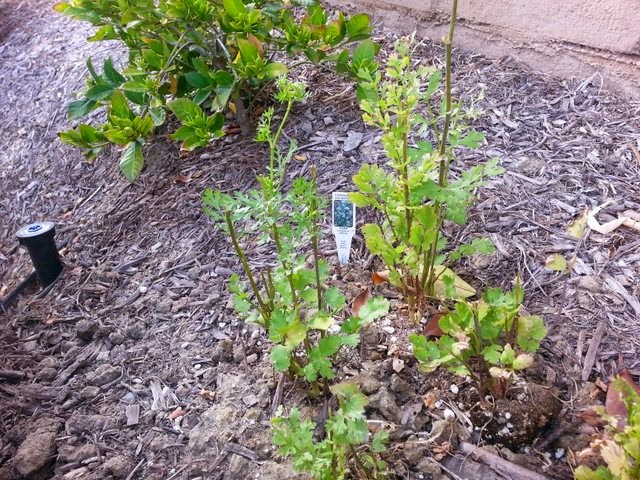The vegetables were surprisingly easy grow, especially those bok-choy bunch: Within one month, they all had gone from tiny dirt grab to verdant green shoots, a couple feet tall, leaves palming wide. After taking one too many of our first ever organic farm produce and giving away a few to friends and neighbors, and their stalks shooting ever higher and started blossoming like giant wild flowers, I decided it's time for them to bow out of their commendable role in food service chain to mankind.
As it happened, I went to a local greenery shop and bought a parade of cute little fruit and vegetable pots for my "shock-and-awe" experiment: a cilantro herb, a garlic shoot, one pea vine, two squashes, two strawberries, 3 varieties of tomatoes, 4 varieties of sweet peppers, and one "finger potato," lining them all up on the same planter stretch where the bok-choys used to sit.
That unglamorous looking strawberry batch turned out to be the earliest pleasant surprise for me: Just a little more than a couple weeks after I planted them, on one of those random "see-if-some-of-them-have-
The squashes were the second surprises I got. Not only did they grow much more robustly than I thought they would (otherwise I would have placed them farther apart so they won't be elbowing each other like they do now), they actually started growing squashes--just like their namesake promises--in about one month period. These were tiny, finger size dills, no comparison to the commercial grade foot-long biggies we see in the market (thus spurned by my wife), but were really crisp, crunchy, sweet and juicy. I take them for breakfast and for snack, and they are as healthy and tasty as none others can be!

The little cilantro herb was actually edible right from the beginning, but I was really hung up by this question: How do I harvest it? It looks to me the whole thing from top to bottom is edible, really, but where should I cut it so the remnant part won't die and can still reproduce? So I kept on postponing, until it started shooting upward instead of crawling sideways, as its original humble frame seemed to indicate it should. So I started "harvesting" by cutting off its leaves and stems from about the mid-body, still not sure if I was doing it the right way. But doubt none about the condimental power of the part that I cut off. We threw a pinch of them in hot soup, and immediately the aroma came and the pungent taste it brought to our tongue was magical. The Great Discovery Era all started when people were looking for spices for trade, weren't they?
The pea vine actually formed its first pea pod way earlier than the first strawberry I saw--so early it was half-consumed by snails and worms already when I spotted it. If there's a first, there's bound to be a second, I thought, optimistically. But the second one never came, yet, and the vine itself seems to be going through some live-and-die cycle already... The mystery and nature of things this non-farming head could hardly understand.
All the tomatoes and sweet peppers are yet to produce their first fruits, though one of the sweet peppers looks promising, bell shaped baby pepper petaled by surrounding leaves, anxiously waiting to show up to the world who they are (and be eaten) soon...
The only plant that dies is the one that again to this urban farm head ought to be the most sturdy, easy-to-grow kind: the potato. I think it actually started withering the day right after I planted it. Be it disease, bugs, bad soil...? The fact the shrub next to it also dies, and it being the replacement from my landscaper for the previous one which also died, indicates ... you guess for me, I am clueless.









No comments:
Post a Comment